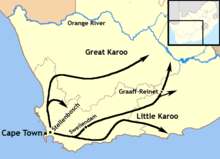Trekking Boers
The Treckburen ( Afrikaans : trekboere , English: trekboers ; German also Trekburen ) were a semi-nomadic pastoral people in South Africa . From around the end of the 17th century they moved from the region around Cape Town to the north or to the expanding eastern area of the later Cape Colony .
The term Treckburen does not refer to the Voortrekker , also Boers who went on the big trek from 1833 . Some of the Voortrekkers were former Treckburen, and on their trains inland they encountered other Treckburen.
history
The ancestors of the Treckburen were Dutch settlers, Franco-Huguenot refugees , German Protestants, Frisians , Flemings , Scandinavians , Scots , Irish , Indian slaves, Khoikhoi and Malays .
The Treckburen were self-sufficient, semi-nomadic farmers who, in search of more productive arable land, set out on treks into the northern and especially the eastern interior of the country, both to find better grazing grounds and to meet the self-governing regime of the Dutch East India Company ( VOC) at the Cape. They reached the Little Karoo in the 1740s, and the Great Karoo in the 1760s . They lived in the ox wagons in which they traveled and seldom stayed long in one place. They were considered good marksmen and waged wars of extermination against the Khoikhoi and especially the San . There were many “mixed races” among the Treckburen, including the Griqua . Several Treckburen settled on the eastern border of the Cape Colony, where their descendants soon became known as Grensburen (Dutch boer , "farmer", so "border farmers"). So around 1770 the first Boer farms were built northwest of Algoa Bay .
The autocratic VOC opposed a Boer group - descendants of trek Boers who had settled on the eastern border of the Cape Colony - and in 1795 declared the cities of Swellendam and Graaff-Reinet to be independent republics . These were lifted in 1796 with the British takeover of the Cape in the wake of the Napoleonic Wars . Another Boer group - also descendants of Treckburen - rebelled a generation later against British rule, which led to the uprising at Slagters Nek in 1815, as a result of which the British executed five leaders of the rebels. After further British interventions and a series of border wars with the Xhosa in the east, as well as a growing need for land, many Boer inhabitants of the Eastern Cape of Treckburo origin became Voortrekkers.

While some of the Treckburen settled and settled in order to live for generations as border farmers and later as Voortrekkers, other Treckburen lived economically as nomadic shepherds. Some Treckburen had crossed the Orange River several decades before the Voortrekkers. During the Great Trek in the area of what would later become the Orange Free State, they encountered already resident Treckburen several times.
In 1799, the Treckbure Coenraad de Buys fled eastwards before being charged. He made wealth by stealing cattle and married numerous women. The Xhosa ruler Ngqika also recognized him as ruler, so Ngqika's widowed mother became de Buys' lover and de Buys Ngqika promised his 15-year-old daughter. In 1815 he was the first white resident to settle in the west of the later Transvaal . He disappeared on a trip on Limpopo .
At the end of the 19th century, both the Treckburen and the Voortrekker were jointly called Boers . During the 20th century, the term Boers was extended to all Afrikaans-speaking whites, including Cape Dutch , whose ancestors were not involved in the trek to the East, but stayed in the Western Cape.
Web links
- Way of life and history of the Treckburen at natal-tourism.co.za (English)
Individual evidence
- ^ The Great Treck 1835–1846 at sahistory.org.za (English), accessed on June 23, 2017
- ↑ Lifestyle of the Treckburen at natal-tourism.co.za (English), accessed on June 23, 2017
- ↑ Hanns Maull (Ed.): South Africa: Politics - Society - Economy before the end of apartheid. Springer, Heidelberg 2013, ISBN 9783322955999 . Excerpts from books.google.de
- ^ A b Norman Etherington: The Great Trek: the transformation of Southern Africa 1815-1854. Routledge, Milton Park 2014, ISBN 9781317883135 . Excerpts from books.google.de
- ↑ Slagter's Nek at natal-tourism.co.za (English), accessed on June 23, 2017

